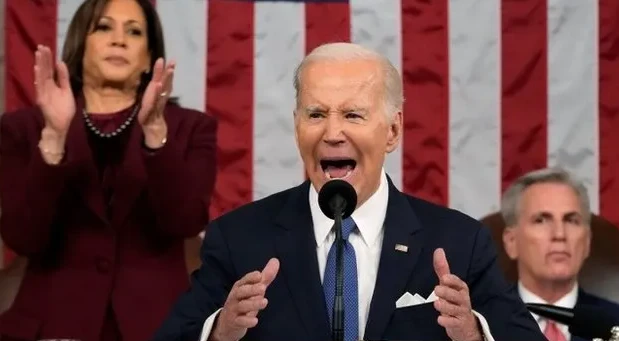This Tuesday night, Joe Biden delivered his second State of the Union address to the U.S. Congress, marking the halfway point of his first term.
It’s a pivotal moment for the U.S. president: he is about to launch a re-election campaign and grapple, for the first time in his presidency, with Republican control of one of the two houses of Congress.
Here are some key points from a spirited and at times combative speech by Biden, who spoke in front of a sharply divided Congress and an audience of tens of millions of Americans.
President Biden Highlights Bipartisan Accomplishments Despite Fierce Partisan Battles
Joe Biden began by congratulating Republican Kevin McCarthy on being elected Speaker of the House of Representatives.
He then spent the first part of his speech highlighting this new political reality in Washington. The chairman boasted of bipartisan accomplishments during his first two years in office.
He pointed to cooperation on infrastructure spending, high-tech investment, military aid to Ukraine, federal protections for same-sex marriage and election reform, among other issues.
“We are often told that Democrats and Republicans can’t work together,” he said. “But over the last two years, we proved the cynics and naysayers wrong.”
Biden acknowledged that there were times when Democrats had to “walk alone,” a phrase that glosses over the fierce partisan battles that took place over the $1 trillion covid relief bill and the Inflation Reduction Act, which increased spending to combat climate change and for health care by billions of dollars.
The president also took credit for those accomplishments, but the new reality is that such sweeping legislative achievements are a thing of the past, at least for the next two years. Every legislative victory Biden will now win will have to be achieved with some Republicans on his side, a difficult hurdle to overcome.
While Joe Biden went out of his way to flaunt his bipartisan credentials during his speech, one of the most pressing challenges facing the White House and Congress in the coming months will be raising the federal debt limit to avoid defaulting on the U.S. national debt.
On that issue, Biden and House Republicans are engaged in a high-stakes game in which neither wants to cave and appear cowardly. And the president, in his speech, showed no signs of flinching.
Referencing Republican demands to tie a debt limit increase to spending cuts, Biden noted that no president added more to the national debt than his predecessor, Donald Trump.

Biden shakes hands with House Speaker Kevin McCarthy.
Biden’s Take on Debt Limit and Social Security-Medicare Funding Cuts
He then tried to link Republican demands on the debt limit to some conservative proposals to cut funding for Social Security and Medicare, the popular retirement and health insurance programs administered by the federal government.
That led to more cries of outrage from Republicans.
Biden said he would present his budget plan and asked Republicans to propose theirs. “We can sit down together and discuss both plans,” he asserted.
But that can be read as a trap: the goal is to put the proposed Republican cuts on the record, giving Democrats a target to attack.
The debt limit fight is just beginning, and bipartisan cooperation will almost certainly take a back seat until the storm subsides.
Biden’s Proposals for Police Reform and Gun Control
Biden unveiled a number of new and repeated proposals, many of which have little chance of becoming law with Republican control of Congress.
He spoke movingly about the need for police reform and new gun control legislation as he pointed out presidential guests in the gallery: the parents of Tyre Nichols, a black man who died from a beating by police officers a few days ago, and a hero of the mass shooting a few weeks ago in Monterey Park, Calif.
“All of us in the House, we have to rise to this moment,” he said. “We can’t walk away.”
The reality, however, is that no effort has much chance of success. If Congress comes together to pass new legislation, it is more likely to address the “junk fees” criticized by the president, including bank surcharges, resort fees and airline seat charges.
“Junk fees may not be important to the very wealthy, but they are important to most people in households like the one I grew up in,” he said.
U.S. politicians may not be able to agree on how to address police brutality and gun violence, but no one likes Ticketmaster’s “convenience” charges.
President Biden’s Approach to Foreign Policy: Balancing National Interests and Global Challenges
While the Chinese surveillance balloon was a big story in the U.S. over the weekend, it barely got a mention from the president in the bottom third of his speech.
“As we made clear last week, if China threatens our sovereignty, we will act to protect our country,” he said. “And we did.”
That was his only mention of the issue.
The president went on to discuss the challenges posed by China and his administration’s steps to strengthen the U.S. economy and modernize the military.
But that did not represent a defiant posture vis-à-vis China.
The Russian invasion of Ukraine, which dominated Biden’s latest State of the Union address, also received barely a mention. The president welcomed Ukraine’s ambassador to the U.S., seated in the audience, and stressed allied support for the European nation.
But he did not take the opportunity to call for new aid for the war-torn nation, aid that will be harder to come by with skeptical Republicans in control of the House.
Biden’s brief foray into foreign policy ended with a bit of patriotism and chants of “America” from the crowd.
There is a saying that Americans only care about foreign policy when American soldiers are dying overseas. Joe Biden, with his focus on the economy and domestic accomplishments, seems to have taken that to heart.

